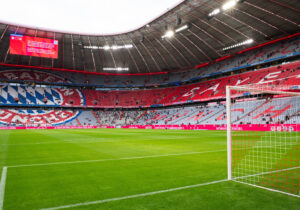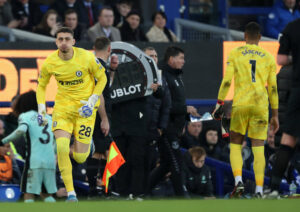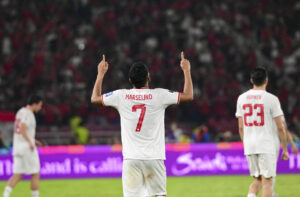The Premier League returns this weekend, but of course, Mesut Özil will not. Having been left out of both Arsenal’s Premier League squad and Europa League squad, Özil is not eligible to play for Arsenal again until January at the absolute earliest, but by then he will be able to speak to foreign clubs about a possible transfer next summer. So, as the German playmaker enters the final few months of his Arsenal career, it is surely not too early to reflect on that career as a whole and consider what it amounts to. Perhaps it is best summed up by the line that Sven-Göran Eriksson invariably trotted out after an international friendly match when he was in charge of the England national team: “First half good, second half not so good”.
Mesut Özil: An Arsenal Career of Two Halves
It Wasn’t All Bad
Such has been the opprobrium heaped upon Mesut Özil in the second half of his Arsenal career – so, since he signed his second and ludicrously lucrative contract with the club in January 2018 – that it is easy to forget the largely positive impact that he had upon the Gunners when he joined them in the summer of 2013. Arsenal fans themselves, so many of whom have now taken to lambasting the languid German, may forget just how excited almost all Gooners were when his signing was first mooted, let alone when it was completed. That was because at that point Özil was probably at the peak of his career, a player whose ability and achievements in the game easily justified what was then an Arsenal record transfer fee of £42.5 million.
In addition, Arsenal fans were delighted because Arsenal had finally spent big money on a player, rather than just receiving big money for a player they had sold, as had been the case with Robin van Persie, Cesc Fabregas, Emmanuel Adebayor and so many others. At a stroke, Arsène Wenger seemed to have ended the austerity years that had accompanied Arsenal’s move to The Emirates in 2006, when the need to repay the money that had been borrowed to build the stadium prevented him from buying the top-class and top-dollar recruits required to replace his original starring cast of Patrick Vieira, Thierry Henry et al.
An Immediate Impact
Özil’s effect upon Arsenal was immediate, and in the most tangible terms – hard, cold, glittering silverware. Astonishing as it may seem now, in the first half of his career (not his Arsenal career but his entire career to date) Özil was something of a trophy-magnet, winning the German Cup with Werder Bremen, the European U21 Championships with Germany, and both the Spanish League and the Spanish Cup with Real Madrid, under Jose Mourinho, when Pep Guardiola’s great Barcelona side were at or very near their peak.
When Özil joined Arsenal, it seemed unlikely that he would carry on collecting winners’ medals, because the Gunners had gone eight years without winning anything at all, their last trophy coming in Patrick Vieira’s last game for the club, the 2005 FA Cup final. Nevertheless, although Arsenal’s title bid in 2013/14 (if it could ever legitimately have been called that) petered out in the spring, the momentum generated by it, along with a succession of favourable home draws, allowed the Gunners to reach the 2014 FA Cup Final against Hull City and win it, even if the man of the match was not Özil himself but the man who coveted his number ten role and the freedom it provided, Aaron Ramsey.
World Cup Triumph for Mesut Özil
That same summer, Mesut Özil achieved an incredible personal double, as he followed up FA Cup success with Arsenal by winning the World Cup with Germany in Brazil. However, even at that point, which should have been the highwater mark of his career or indeed any footballer’s career, there were already dissenting voices, both in Germany and England. Some argued that Özil did not actually contribute very much to Germany’s success and certainly nothing like his succession of superb performances, culminating in an almost one-man destruction of England, in the previous World Cup in South Africa in 2010.
Enter Sanchez
Nevertheless, Özil continued at Arsenal and was augmented by the signing of another world-class player, Chile’s Alexis Sanchez. Indeed, Sanchez actually surpassed Özil in almost every important respect: goals; assists; and above all in the affection of fans. It was even argued by some Arsenal fans that the team would be better off with just Sanchez in it, in his preferred number ten role. (As Gary Neville famously said a few years ago, “Everyone wants to be a number ten nowadays”.)
However, Wenger was shrewd enough to balance the two little geniuses in the same team – indeed, he went further and played with three diminutive attacking midfielders by dropping Santi Cazorla back into central midfield, where for a brief period his truly two-footed passing brought out the best of the attackers in front of him, including Özil and Sanchez. That phase of Özil’s Arsenal career culminated in the 2015 FA Cup triumph over Aston Villa, after which almost all the Arsenal players, when they were interviewed on the pitch, declared that the next target was the Premier League.
But Exit Cazorla
Alas, that Arsenal team, in which Özil, Sanchez and Cazorla somehow all dovetailed beautifully, never lasted the course of an entire Premier League season. In the autumn of 2015, Cazorla suffered the first of the series of injuries that eventually ended his Arsenal career, and Wenger’s inability to replace him (how he must have rued not re-signing Cesc Fabregas from Barcelona in the summer of 2014 when he had the chance to) meant that Gunners side was only ever a cup side and not a title-winning team. They proved that again when they defeated champions Chelsea – Fabregas and all – in the 2017 FA Cup final, making it three FA Cups in four years after nearly a decade without any silverware at all before that. And the fact that this little Golden Age (or at least Silverware Age) had coincided with Özil’s arrival at the club was surely more than mere coincidence.
So, the first half of Özil’s Arsenal career, which roughly covers the five years of the contract that he signed when he first joined the club, can be considered as a success, or at the very least a qualified success, for both the player and the club. If he had been unable to galvanise the Gunners into challenging for the Premier League, let alone the Champions League, he had still played a key part in a side that had proven they could beat anyone on their day and often did, especially at Wembley.
However, it was soon followed by the second half of his Arsenal career, roughly covering the three-and-a-half years of the second contract that he signed at The Emirates, which can only be considered as an unqualified disaster.
To read Part Two of this article, click here.
Main Photo






